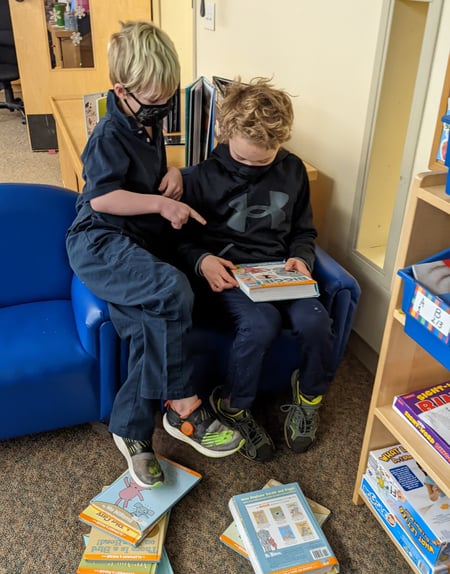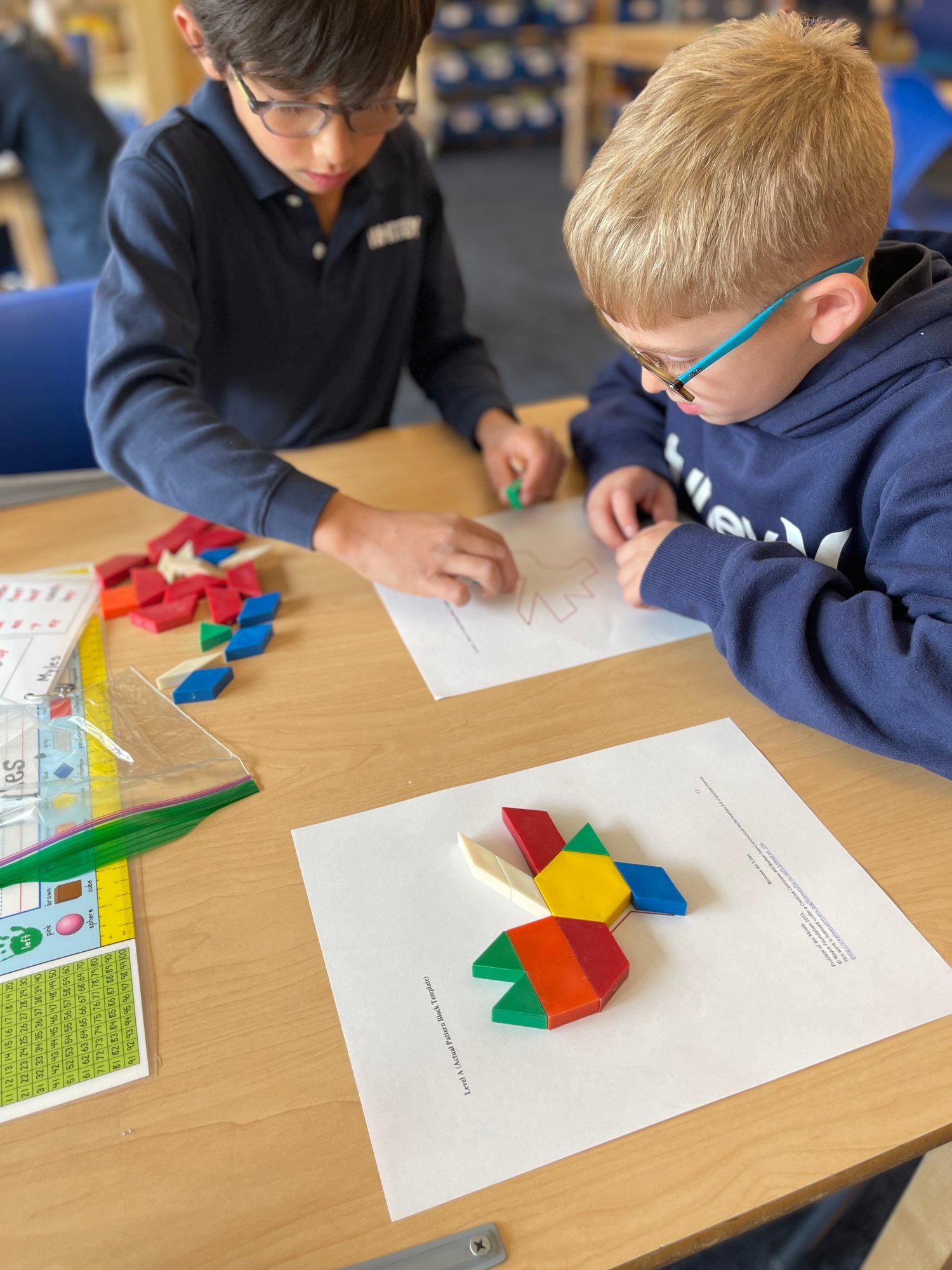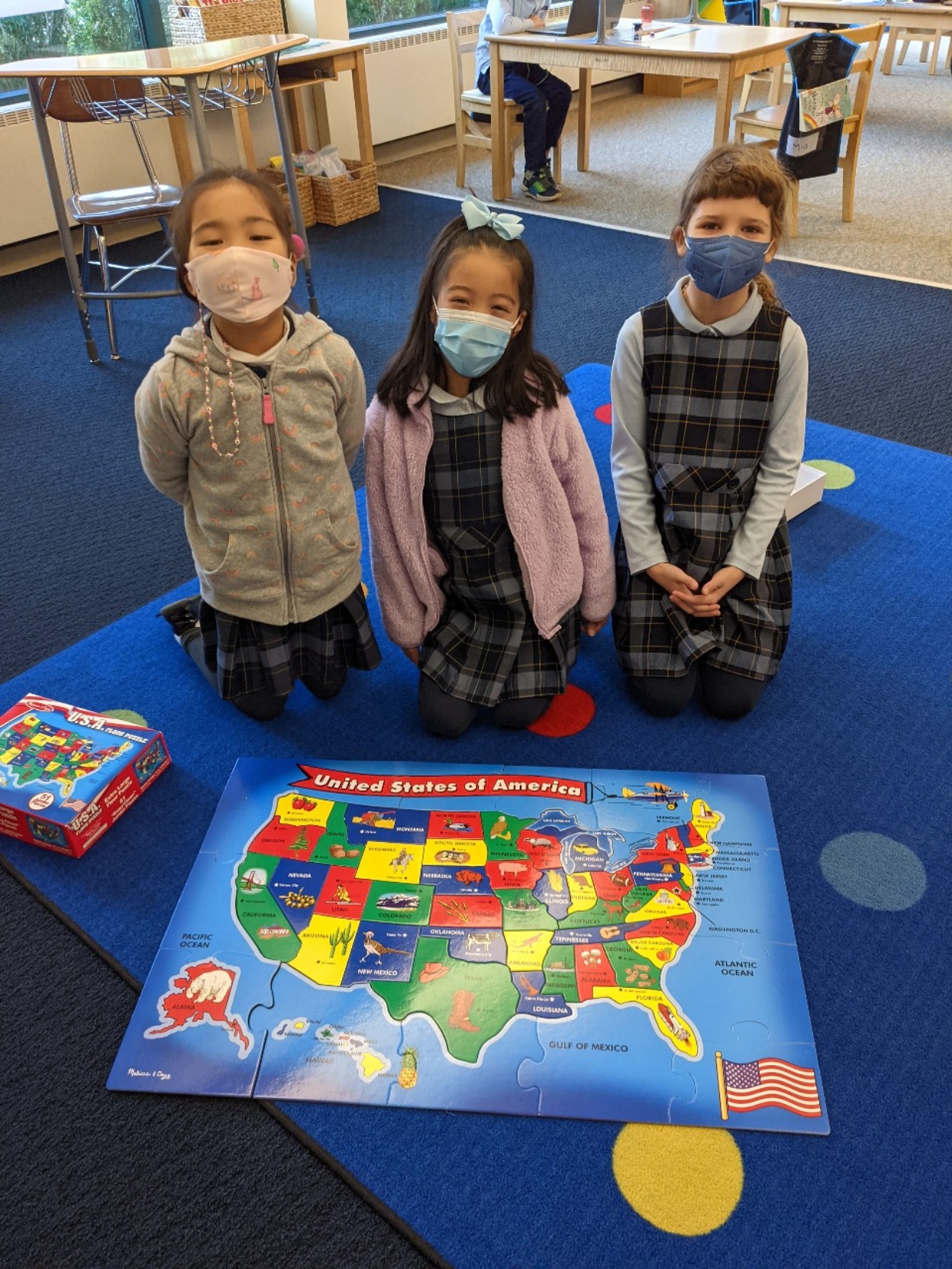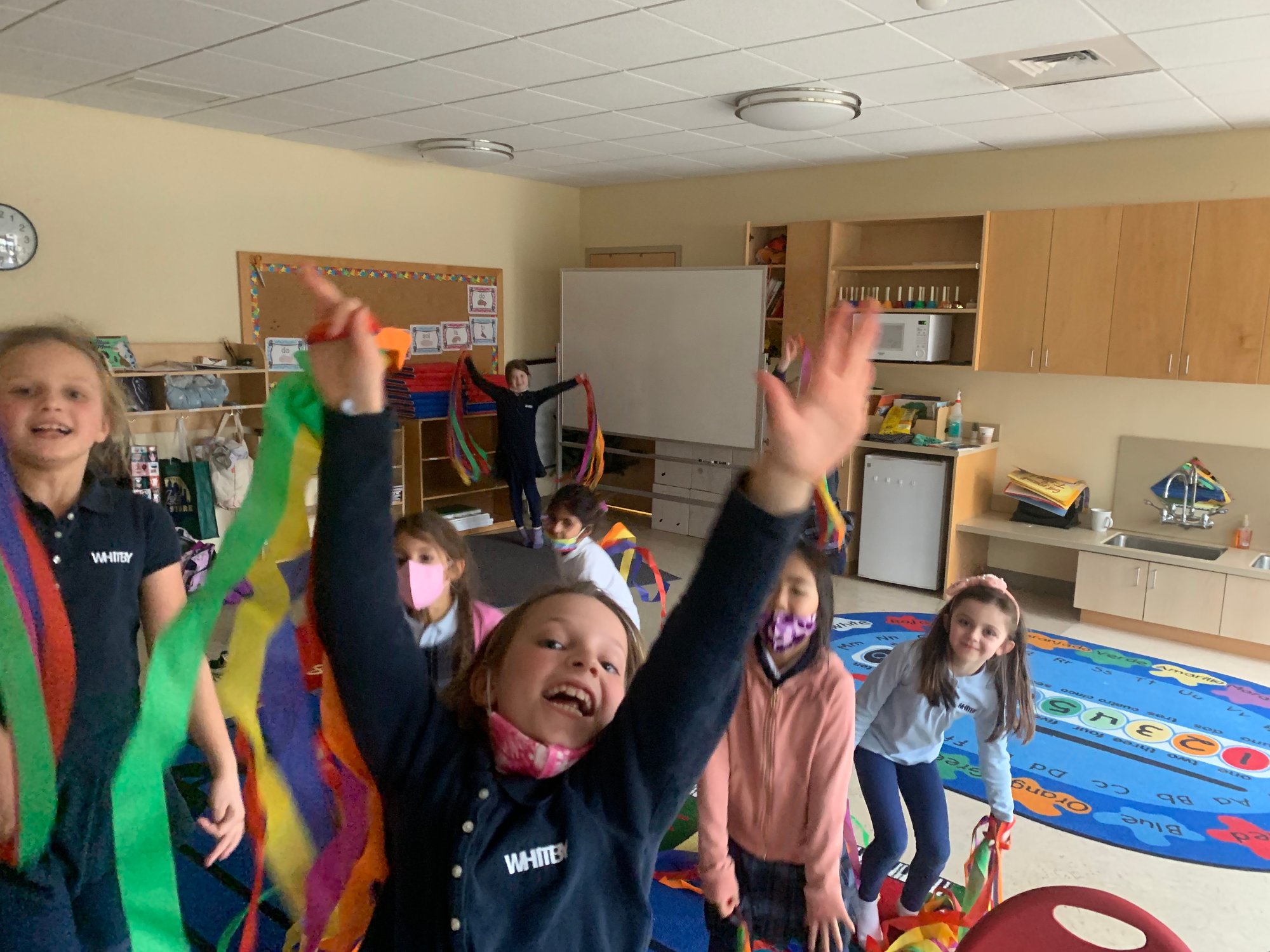Social-emotional learning is embedded in the Montessori and IB principles and structures that frame curriculum at Whitby. We intentionally structure the schedules in Lower School to provide time for community building and targeted lessons with a focus on social emotional learning, supported by a variety of curated resources.
Lower School Curriculum Guide
TABLE OF CONTENTS
Introduction
We define curriculum as all we do with intention. The Whitby Lower School Curriculum Guide aims to provide an overview to families and staff that scribes our approach to teaching and learning and the goals and objectives that inform that learning.
One of our focuses is to nurture and provide opportunities for students to observe and model the attributes of the Learner Profile. The aim of all IB programs is to develop internationally minded people by encouraging all members of the school community to become active, compassionate, and lifelong learners. We utilize the Learner Profile to guide students toward positive behavior and the creation of a classroom community of learners where everyone is valued.
For further inquiries, please contact the Lower School Office.
Mission
Whitby inspires a passion for learning and empowers each child to take responsibility as an open-minded, principled citizen in a global community.
The IB Learner Profile
The aim of all IB programs is to develop internationally minded people who, recognizing their common humanity and shared guardianship of the planet, help to create a better and more peaceful world. As IB learners, we strive to be:The IB Primary Years Program
Our Lower School curriculum is framed by the principles of the International Baccalaureate Primary Years Program. Engaging with the Whitby curriculum requires students to ask questions and find answers through inquiry and discovery. Student learning is contextualized by the units of inquiry exploring larger concepts that are broad, abstract, and timeless. These “big ideas” are interwoven across different subjects, enabling students to learn to analyze, think critically, communicate and solve complex problems. They develop adaptive expertise - the ability to apply understandings to new contexts.
Learning in the Lower School at Whitby represents the continuation of a robust educational continuum that extends from Stepping Stones to Grade 8. Whitby educates the whole child through inquiry-based learning, informed instruction, and continuous assessment.
This approach provides greater depth in key subject areas and eases the transition to middle and high school, with the IB program providing the underlying structure of themes and concepts. Whitby’s curriculum ensures proper competencies are met, and sequencing and transitions are smooth from grade to grade. Graduates of Grade 8 are fully prepared for secondary school and life beyond Whitby.
For further information on the IB Primary Years Program, visit the International Baccalaureate Organization website at www.ibo.org.
Informed Learning

Our curriculum objectives are informed by principles and research-based standards from the International Baccalaureate Primary Years Program as well as Common Core State Standards, and Next Generation Science Standards (NGSS).
Every day, we collect information about student learning. We monitor each child’s progress towards these learning objectives, through a balance of formal and informal assessments.
Using this information about student learning, we make informed decisions about instruction, designing learning engagements, enriching, accelerating and supporting students as we “meet them where they are” in their learning. Flexible grouping honors our students’ changing abilities, interests and learning styles.
Students learn how to be informed learners. They develop agency and ownership of their own learning through the continuum from Children’s House up through Middle School. They partner with teachers in a process of goal setting and reflection so that they learn and practice the life-long skill of understanding themselves as learners.
Reporting on Learning
How do we communicate students' growth and progress?
Reporting on learning is about communicating what students know, understand, and can do. It describes the progress of children's learning and identifies areas of strength and growth. This learning progress is monitored through the lens of curriculum objectives, informed by standards. At Whitby, students have an integral role in the reporting cycle, reflecting on their learning, setting goals, and discussing their progress with teachers and parents. At Whitby, we communicate information about a student's achievement and progress in a number of ways.
Digital Portfolios
In the Lower School, we use Seesaw to document and reflect on learning. Seesaw is a digital learning portfolio that allows students and teachers to show, reflect and share their learning. Students can use photos, video, audio, and text to capture the learning process, not just the end result, and explain how they arrived at their understanding. Parents are invited to be active participants in their child's learning journal. At the beginning of the school year, we will send you a QR code inviting you to Seesaw. If you choose to get notifications, you can see entries to the journal and comment on them. We believe this interactive engagement can bring your child's Whitby classroom experience closer to home.
Assessment Folders
Formal assessments are sent home regularly in assessment folders on a regular basis, with specific feedback related to unit objectives. Students are formally assessed in all curriculum areas with various performance tasks (i.e., projects, oral and visual presentations, debates) or written assessments. These assessments are sent home for parent review after the assessment data has been shared with the student.
Student Work and Teacher Student Conferences
Teachers provide feedback on students' work on an ongoing basis. This feedback is specific, timely, and meaningful (supportive and constructive). Often this feedback is communicated through informal conferences, which are incorporated into the regular classroom routines and provide students with feedback on their progress. These conferences ensure students reflect on their work and understand their strengths, areas needing development, and next steps.
Teacher-Parent-Student Conferences
In the Lower School, we host two parent conferences per school year. Teacher-Parent-Student conferences are scheduled in November for all Lower School families. Student participation is highly encouraged. In April, we host student-teacher-parent portfolio conferences, which require the students' presence as they share their learning journeys with their parents.
Teachers and parents may also request conferences to discuss student learning or any other issue at any time.
Report Cards
We formally report on student progress towards end-of-year goals in report cards twice a year through standard-based report cards with a narrative component for each subject area which captures a holistic picture of the learner and communicates students' individual growth and their "next steps."
For more information about Whitby's assessment, please refer to the assessment policy.
Subjects of Learning
Social Emotional Learning (SEL)
Social and emotional learning (SEL) provides a foundation for safe and positive learning and enhances students' ability to succeed in school, careers, and life. SEL is an essential and integral part of the curriculum; it is transdisciplinary yet needs to be thoroughly planned and carefully implemented. SEL is concerned with our students' ongoing development and growth with respect to feelings, beliefs, and behaviors and how they interrelate. SEL is included in the curriculum in order to help students
- develop an understanding of how to manage and communicate their feelings
- understand how their choices and practices can maintain their health and safety
- develop an awareness of social norms and perspectives
- build relationships and develop an appreciation of commonalities and differences
- develop strategies to resolve conflicts
- recognize rights and responsibilities toward others and the environment
- develop self-management strategies to become successful learners

Unit of Inquiry
Students at Whitby inquire into and learn about local and global issues in the context of units of inquiry, each of which addresses a particular transdisciplinary theme.
Each of these units:
- Stands alone as an engaging, challenging, relevant and significant experience
- Contributes to a coherent, school-wide program of inquiry that is framed in terms of transdisciplinary themes of global significance
- Draws together elements of different subject areas (language, mathematics, personal social physical education, the arts, science and social studies) to support the exploration of a central idea
Language Arts
At Whitby, Language is being taught through the context of the units of inquiry. We have drawn on the IBPYP Language Scope and Sequence documentation and the Language Common Core Standards ensuring balance of the significant strands of Language. Some aspects of the language curriculum might be taught as a stand-alone using a constructivist, inquiry-based approach.
Learning is not a linear process. Different learners develop proficiencies at different times and at their own pace. Specific outcomes for each grade level describe what learners are expected to know, understand and be able to do by the end of this grade level. The assessments of the language outcomes inform teachers to set specific learning goals for their students. The individual progression of the child is shared with parents in parent-teacher conferences and report cards.
At Whitby, students develop into confident and competent readers and authors. Students read and write independently and in a variety of group settings on a daily basis. Teachers facilitate different reading experiences: read aloud, shared and guided reading, reading conferences, and independent reading. Similarly, students engage in a variety of writing experiences. They include shared, guided and independent writing as well as individual writing conferences. Additionally, students engage in word study, which involves the areas of phonics, morphemic analysis, spelling, and grammar.
Students will learn to print letters legibly and with the appropriate style. By Grade 2 at the latest, most students are introduced to cursive writing and encouraged to write in cursive in their daily work. Students are encouraged to write in cursive from then on throughout Lower School.
Whenever possible, the units of inquiry inform the selection of text and topics. Therefore, students spend a substantial amount of time reading and writing on a daily basis.

Mathematics
At Whitby, our students are given the opportunity to construct, transfer and apply mathematical understanding. We have drawn on the IBPYP Mathematics Scope and Sequence documentation and the Mathematics Common Core Standards in the process of refining our scope and sequence and ensuring balance of the significant strands of Mathematics.
Learning is not a linear process. Different learners develop proficiencies at different times and at their own pace. Specific outcomes for each grade level describe what learners are expected to know, understand and be able to do by the end of this grade level. The assessments of outcomes inform teachers to set specific learning goals for their students. The individual progression of the child is shared with parents in parent-teacher conferences and report cards.
Mathematics is being taught, whenever possible, through the realistic context of the units of inquiry; if the direct teaching of Mathematics in a unit of inquiry is not feasible, it is taught as a stand-alone using a constructivist, inquiry-based approach.
Mathematics is arranged into six main strands: Operations and Algebraic Thinking, Number and Operations in Base Ten, Number and Operations - Fractions, Data Handling, Measurement, and Geometry.
All mathematical teaching develops knowledge and understanding of eight mathematical processes that are integrated with all mathematical experiences. Explicit teaching and practice of these processes is incorporated into all mathematical teaching.
The 8 processes of mathematics are:
- Make sense of problems and persevere in solving them
- Reason abstractly and quantitatively
- Construct viable arguments and critique the reasoning of others
- Model with mathematics
- Use appropriate tools strategically
- Attend to precision
- Look for and make use of structure
- Look for and express regularity in repeated reasoning

Science
Science at Whitby is taught entirely within the PYP Program of Inquiry. We have drawn on the IBPYP Science Scope and Sequence documentation and the Next Generation Science Standards in the process of refining our scope and sequence and ensuring balance of the significant strands of Science: Nature of Science, Living Things, Earth and Space, Physical Science (Structure and Properties of Matter and Forces and Energy). Major conceptual ideas are developed over the entire Lower School curriculum, and inquiry is the main approach in the organization and selection of students’ activities.
Nature of Science (integrated into all strands)
The Nature of Science strand is the overarching, unifying strand. Through it, students learn what science is and how scientists work. Students develop the skills, attitudes and values to build a foundation for understanding the world. Students come to appreciate that while scientific knowledge is durable, it is also constantly re-evaluated in the light of new evidence. Students learn how science ideas are communicated and to make links between scientific knowledge and everyday decisions and actions. These outcomes are pursued through the following major contexts in which scientific knowledge has developed and continues to develop.
The basic understandings about the nature of science are:
- Scientific Investigations Use a Variety of Methods
- Scientific Knowledge is Based on Empirical Evidence
- Scientific Knowledge is Open to Revision in Light of New Evidence
- Scientific Models, Laws, Mechanisms, and Theories Explain Natural Phenomena
- Science is a Way of Knowing
- Scientific Knowledge Assumes an Order and Consistency in Natural Systems
- Science is a Human Endeavor
- Science Addresses Questions About the Natural and Material World

Social Studies
Social Studies at Whitby is taught entirely within the PYP Program of Inquiry. We have drawn the Social Studies Strands from the IB PYP Scope and Sequence documentation as well as international and national curriculum in the process of refining our scope and sequence and ensuring balance of the significant strands of Social Studies: Human Systems and Economic Activities, Social Organization and Culture, Continuity and Change over Time, Human and Natural Environments, and Resources and the Environment. Major conceptual ideas are developed over the entire Lower School curriculum, and inquiry is the main approach in the organization and selection of students’ activities.
Knowledge and skills in social studies
In the PYP, social studies is essentially about people: how they think, feel and act; how they interact with others; their beliefs, aspirations and pleasures; the problems they have to face; how and where they live (or lived); how they interact with their environment; the work they do; and how they organize themselves. The social studies component of the curriculum provides opportunities for students to:
- formulate and ask questions about the past, the future, places, and society
- use and analyze evidence from a variety of historical, geographical, and societal sources
- orientate in relation to place and time
- identify roles, rights, and responsibilities in society
- assess the accuracy, validity, and possible bias of sources

World Languages - Spanish and Chinese
The Lower School Language Acquisition Program focuses on oral language development. The aim of studying world languages is to acquire language skills and to develop respect and understanding of diverse linguistic and cultural heritages. Whenever possible and appropriate, the program supports or is integrated into the Program of Inquiry. As a result, the students are able to make connections between the language they acquire and their transdisciplinary units of inquiry. We also strive to support the students in developing the attributes of the IB Learner Profile.
Teaching and learning in language acquisition are organized into three proficiency levels - emergent, capable and proficient. Each level focuses on two phases. In total, there are six phases. The phases represent a developmental continuum of additional language learning. Depending on their prior additional language-learning experiences, students may commence their language acquisition course in any phase on the continuum and may exit from any phase on the continuum. In Lower School, most learners begin their language acquisition journey in grade 1 at the emergent level in phase 1 or 2.
In Lower School, students can choose to learn Spanish or Chinese. Typically, students enter the Chinese program in Grade 1. Students with prior knowledge of Chinese can also join the Chinese program in grades 2 - 4.
The language acquisition objectives represent some of the essential processes of language and have been organized under four communicative processes:
- Listening
- Speaking
- Reading
- Writing
Each objective is elaborated by a number of indicators of the learning expectation. The strands are subsets of each whole objective and are considered when planning, teaching, assessing and reporting on the student’s language development and communicative competence. The indicators s focus on purpose, context, language control, accuracy, and fluency. As students progress through the language acquisition phases, the expectations for each indicator will become increasingly complex due to the progression in the development of each skill.

Music
The music curriculum is designed to help students develop an understanding and appreciation of music, as well as acquire the practical skills needed to cultivate a lifelong source of enjoyment and personal satisfaction.
Music is a fundamental form of both personal and cultural expression, through which we express feelings and share ideas. Music enables students to appreciate and understand aspects of their own culture and place in the world, as well as those of others. Students are encouraged to consider music as a means of communication: an expressive language with creativity at its heart.
Whenever possible and appropriate, the music program supports and is integrated into units of inquiry. There are also units during which the music program offers independent inquiry into music-related ideas and concepts, as well as skill-based teaching.

Visual Arts
We believe that Visual Arts play a fundamental role in the education of the whole child. Visual Arts education includes the development of creative skills, verbal and nonverbal expression, an awareness of the perspectives of others and aesthetic appreciation.
Whenever possible and appropriate, the art program supports and is integrated into units of inquiry. There are also units during which the art program offers independent inquiry into art-related ideas and concepts, as well as skill-based teaching.
Physical Education
Physical Education is concerned with the physical, social, personal, and emotional aspects of our students’ development. It gives students the opportunity to learn about movement and through movement. Skills are developed through a wide variety of physical activities designed to ensure maximum participation by all. PE also provides opportunities for cooperation, teamwork, decision-making, and problem-solving. The students will develop knowledge and understanding in the strands of individual pursuits, movement composition, games, adventure challenges, and health-related activities.
Individual pursuits: The development of basic motor skills and the body’s capacity for movement through locomotors and manipulative skills and/or experiences; the techniques, rules, and purpose of a range of athletic activities (for example, track and field, swimming, skating, skiing); recognizing a high level of achievement and how to improve performance.
Movement composition: Recognizing that movements can be linked together and refined to create a sequence of aesthetic movements. Movements can be in response to stimuli or performance elements and/or criteria and can communicate feelings, emotions, and ideas (for example, gymnastics, dance*, martial arts).
Games: Recognizing the challenges presented by games; the importance of manipulating space; categorizing games; identifying and developing appropriate skills and strategies; recognizing the importance of rules and how they define the nature of a game; modifying existing games and creating new games; and teamwork.
Adventure challenges: A variety of tasks requiring the use of physical and critical-thinking skills by individuals and/or groups; challenges that require groups to work together collaboratively in order to solve problems and accomplish a common goal; recognizing the role of the individual in group problem-solving.
Health-related fitness: Recognizing and appreciating the importance of maintaining a healthy lifestyle; the body’s response to exercise, including the interaction of body systems and the development of physical fitness. (IB PYP Making the PYP Happen, 2007)

Information and Communication Technology (ICT)
Whitby School recognizes the need to integrate information and communication technology (ICT) in the educational process to enhance learning, support the students in their inquiries, and develop their conceptual understanding. It is a tool of learning, albeit with its own set of skills, as opposed to an additional subject area. We have adopted a flexible learning model that encourages collaboration and team teaching between the classroom teachers, the Librarian/Media Literacy Specialist, the Technology Specialist and the members of the IT department in an effort to identify technologies that can be used to enhance, engage and support student learning.
The Lower School uses a variety of resources such as laptops, cameras, iPads, 3D printers, robots, and other resources in order to develop critical ICT skills required for students of the 21st century. These skills are taught through all curriculum areas, where they are learned in meaningful ways in the context of classroom learning.
School-Home Connection
Communication - Partnership
We believe a strong partnership between the families and the school is key to a positive learning experience for students. Please know that teachers are always happy to hear from you and communicate with you. Please understand that before and after school teachers are concerned with preparation or arrival and dismissal duties. Please reach out to teachers via email to arrange a meeting if needed.
Phone
Face-to-face or phone conversations are the preferred way of communication with our families. Please reach out to teachers via email to arrange meetings. Voicemail should not be used to arrange a conversation or meeting.
Newsletter and Ask me About
Each grade level will publish an e-newsletter at the start of each unit of inquiry to inform about teaching and learning in the upcoming weeks with a link to the class page in Veracross.
By the end of the week, each classroom will send out an email (Ask me About) providing parents with possible questions to engage their child in a conversation about their learning this week.
Veracross Class Pages
Please check the student's Veracross class page frequently. We use class pages to inform about class activities and important dates. You can also refer to the Ask Me About on the class pages. Pictures and videos are shared on Seesaw.
Please always copy all classroom teachers in emails about your child. We strive to respond to emails within 24 business hours.
Should there be any notifications about the daily routine of a child, please let the school know as soon as possible
Please notify the Reception Desk through Veracross of any dismissal changes.
Homework
Homework is assigned both to reinforce concepts taught in class and to foster a sense of responsibility and independence. Recommendations for time spent on homework per subject area vary and aim to support, develop and strengthen student learning. Teachers aim to provide homework that is developmentally appropriate and provide the necessary support and scaffolding to enable student success. The length of specific assignments vary based on curricular goals, grade level and the individual student.
Birthdays
Birthday celebrations are welcomed and encouraged in the classroom. Students are invited to bring a special treat (a bite-sized snack that follows Whitby’s nutritional guidelines) to school to share with their classmates.
Classroom Activities
Over the year, parents will have numerous occasions to see their children engaged in learning. Besides the three special visitor days scheduled over the year, each classroom will find opportunities to share learning with the parents within the unit of inquiry or for other curriculum areas.

